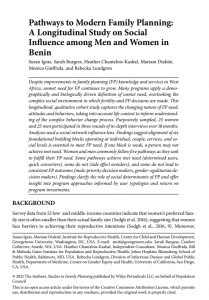Pathways to Modern Family Planning: A Longitudinal Study on Social Influence among Men and Women in Benin
This article was published in the March 2021 issue of Studies in Family Planning.
Despite improvements in family planning knowledge and services in West Africa, unmet need for family planning continues to grow. Many programs apply a demographically and biologically driven definition of unmet need, overlooking the complex social environment in which fertility and family planning decisions are made. This longitudinal, qualitative cohort study captures the changing nature of family planning need, attitudes and behaviors, taking into account life context to inform understanding of the complex behavior change process. Purposively sampled, 25 women and 25 men participated in three rounds of in-depth interviews over 18 months. Analyses used a social network influence lens. Findings suggest alignment of six foundational building blocks operating at individual, couple, services, and social levels is essential to meet family planning need. If one block is weak, a person may not achieve met need. Women and men commonly follow five pathways as they seek to fulfill their family planning need. Some pathways achieve met need (determined users, quick converters), some do not (side effect avoiders), and some do not lead to consistent family planning outcomes (male-priority decision makers, gender–egalitarian decision makers). Findings clarify the role of social determinants of family planning and offer insight into program approaches informed by user typologies and return on program investments.
- Download
- File Size: 248.58 KB
Resource Snapshot

Year 2021
 Where We Work
Where We Work  Press Room
Press Room  FACT Project
FACT Project  Passages Project
Passages Project  Learning Collaborative
Learning Collaborative  Search All Resources
Search All Resources  Social Norms
Social Norms  Fertility Awareness Methods
Fertility Awareness Methods